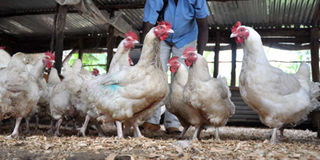Insights on infectious bursal disease

A poultry farmer inspects his chicken. The infectious bursal disease's virus can be prevented through vaccination of healthy birds. FILE PHOTO | NMG
What you need to know:
- Sick birds shed the virus in faeces for two weeks post infection.
- The severity of the clinical signs depends on the age and breed of the bird.
- The virus can be prevented through vaccination of healthy birds.
This disease, also called Gumboro, mainly affects birds older than three weeks of age.
It targets the bursa of fabricius which is an organ found in young birds developing immune system.
A death rate of up to 60 percent may be seen in birds aged between 3-6 weeks.
The disease is highly contagious and is spread through air and faecal contamination of feed and water.
Sick birds shed the virus in faeces for two weeks post infection. The clinical signs of the disease include:
- Depression
- Ruffled feathers
- Watery diarrhoea (White due to urates) that mutts on the vent feathers
- Inflamed cloaca due to vent pecking
- Loss of appetite
- death
The severity of the clinical signs depends on the age and breed of the bird; Layers are more susceptible than broilers.
Treatment
The disease has no treatment but antibiotics may be prescribed as the birds develop opportunistic infections. Give the birds Stressmix in their drinking water as the infection is a stressful event.
Prevention
The virus can be prevented through vaccination of healthy birds. The common vaccine is administered through drinking water.
Ensure that the birds are deprived of drinking water for 1-2 hours so that they are thirsty enough to drink the vaccine immediately once presented to them.
Like for all vaccines administered through drinking water, ensure that water used to dilute the vaccine is free from chlorine or any disinfectants as they may affect the efficacy of the vaccine.
Ensure that you obtain a vaccine schedule from the hatchery as you collect your day old chicks.
***
The writer is a Veterinary Surgeon and the Animal Health Manager at Elgon Kenya Ltd. Reach him through +0733715102 or e-mail him through [email protected]





